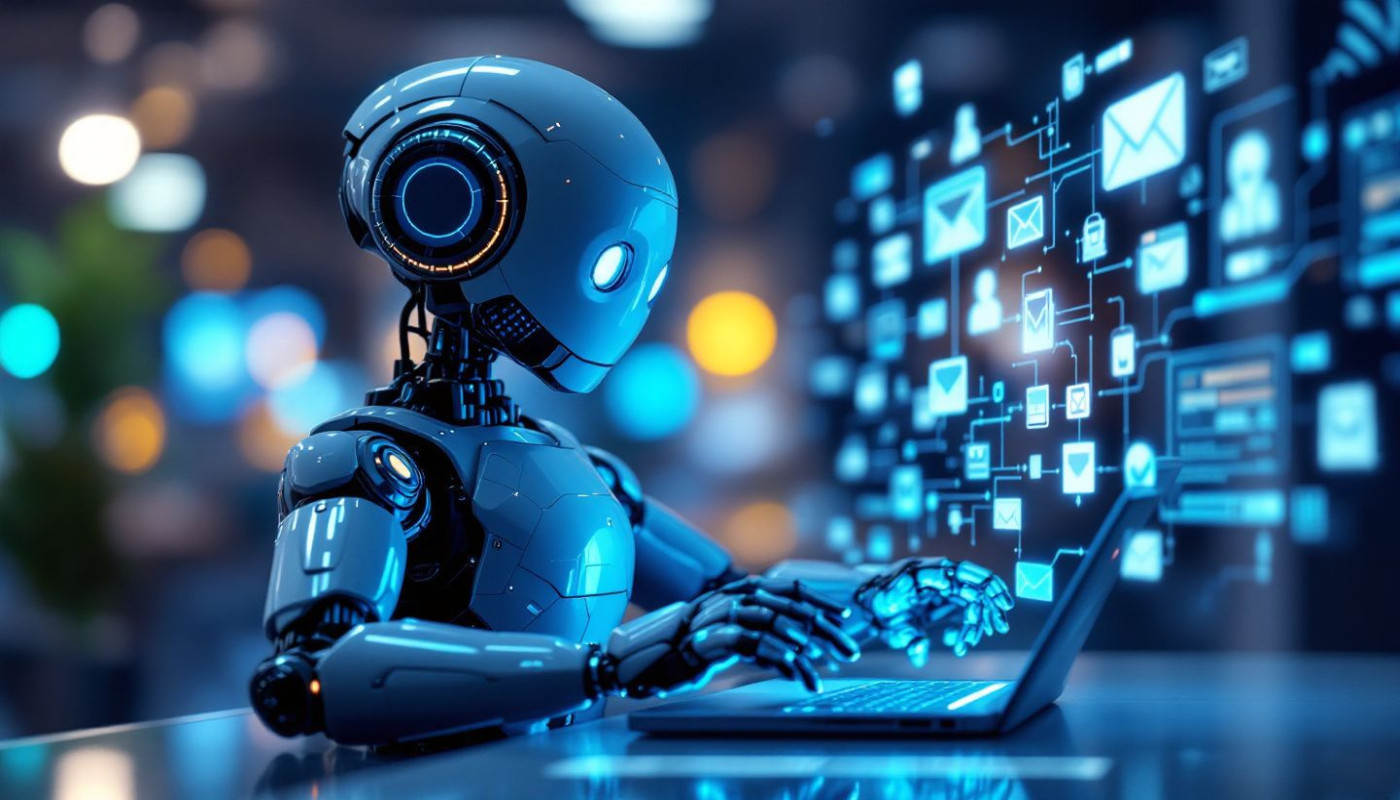Table of contents
In an era where digital transformation has become a staple for competitive businesses, harnessing the power of artificial intelligence (AI) to streamline operations is no longer a futuristic vision but a tangible reality. The integration of AI-driven workflow automation into business processes is not just enhancing efficiency; it's fundamentally altering the way companies operate. From reducing human error to significantly cutting down on task completion times, the benefits are manifold. This transformation promises to unlock unprecedented levels of productivity and innovation. As we delve into the intricate mechanics of AI and its role in modern-day business, it becomes clear that the potential for growth is immense. This exploration invites readers to envision a future where workflow automation is intricately woven into the fabric of business success. Discover how embracing AI-driven technologies can propel your business processes into a new era of sophistication and agility.
The Dawn of AI in Business
The introduction of artificial intelligence (AI) into the corporate world signified a monumental shift in how companies operate. This transition, often referred to as "AI integration," transformed the landscape of business processes from a reliance on time-consuming manual efforts to sophisticated business automation systems. With the ability to learn and adapt through machine learning algorithms, AI quickly became the backbone of workflow enhancement, streamlining operations across various industries.
As a result, organizations witnessed significant productivity enhancement. Mundane and repetitive tasks were relegated to AI-driven tools, which operated with a precision and speed unattainable by human employees alone. Not only did this free up workforce time to focus on more strategic initiatives, but it also led to substantial error reduction. The meticulous nature of AI systems minimized the risk of human error, ensuring a higher standard of output and reliability in business functions, ultimately leading companies to embrace the transition from manual to automated processes.
Optimizing Operations with AI
In the realm of operations optimization, AI-driven automation has marked a transformative era for several key areas within business operations. For instance, data entry automation, fueled by intelligent algorithms, has substantially reduced manual input errors and accelerated data processing speeds. By leveraging machine learning, AI systems can now predict and execute routine tasks, freeing up human resources for more strategic initiatives. A notable feature of AI in customer service is the application of natural language processing (NLP), which allows for the creation of chatbots and virtual assistants capable of interpreting and responding to customer inquiries with human-like understanding, thereby enhancing the customer experience while optimizing support staff workload.
Furthermore, inventory management AI has revolutionized how businesses track and manage stock. Dynamic AI systems are capable of analyzing sales patterns, predicting demand, and even assisting with reorder processes to maintain optimal inventory levels without human intervention. This not only reduces the occurrence of overstocking or stockouts but also allows operations managers to focus on improving other aspects of the supply chain. Altogether, these advancements in AI-driven automation are significantly streamlining business processes, leading to a more efficient, responsive, and cost-effective operational framework.
Enhancing Decision-Making Capabilities
AI decision-making has profoundly transformed the landscape of business strategy and operations, offering predictive analytics and real-time data insights that equip organizations with a competitive edge. By leveraging the power of AI, businesses can now predict trends and outcomes with a remarkable degree of accuracy, allowing for more informed and precise strategic planning AI approaches. The use of big data analytics has become a linchpin in this process, enabling the analysis of vast data sets to discern patterns and predictions that were previously undetectable.
Risk assessment automation, another critical facet, employs AI to identify potential threats and weaknesses within an organization's operations. The integration of AI tools streamlines the risk assessment process, providing a systematic and unbiased analysis of risk factors. This level of automation allows companies to proactively mitigate risks before they escalate into more significant issues. Through the application of AI in strategic planning and risk management, companies can not only anticipate future scenarios but also devise robust strategies to navigate through them effectively, ensuring sustainability and long-term success.
AI and the Customer Experience
In the dynamic landscape of modern business, artificial intelligence has fundamentally transformed the way companies interact with their customers. Personalized customer interactions have become a hallmark of the AI customer experience, allowing businesses to cater to individual preferences and behaviors. With the integration of sophisticated algorithms and data analytics, tailored recommendations are provided, ensuring that each customer feels uniquely understood and valued.
Automated customer support systems, powered by AI, have significantly improved response times and accuracy in addressing customer inquiries. This automation has not only streamlined support operations but also enhanced customer satisfaction AI metrics, a testament to the technology's impact on the overall consumer journey. In the realm of customer relationship management (CRM), AI has ushered in a new era where predictive analytics and machine learning enable companies to anticipate customer needs and deliver proactive solutions, further cementing brand loyalty and trust.
For those interested in exploring how AI can revolutionize their business workflows and customer engagement strategies, visiting the official site of Nation AI could provide valuable insights. Their generative AI solutions exemplify the cutting-edge technologies that are reshaping the landscape of customer-company interactions, propelling businesses towards a more efficient and customer-centric future.
Future Trends in AI Workflow Automation
As we chart the trajectory of AI future trends, it is becoming increasingly clear that workflow automation advancements are set to play a pivotal role in the business process evolution. Experts, such as Futurists and Industry Analysts, are keenly observing the transformative AI technology as it becomes more nuanced and sophisticated. In the coming years, we can anticipate that innovative automation solutions will integrate deeper into the fabric of daily business operations, enabling companies to make strides in efficiency and productivity.
One of the significant shifts we might observe is the rise of self-improving AI systems that can analyze their performance and refine their algorithms without human intervention, thus dramatically enhancing the decision-making process. With the advent of more advanced data analytics capabilities, AI will be able to predict consumer behavior and market trends with higher accuracy, allowing businesses to tailor their services proactively. Meanwhile, artificial intelligence ethics will become an increasingly debated topic, as the need to regulate and ensure fair, unbiased, and transparent AI decision-making processes becomes imperative.
Moreover, we can expect to see a seamless integration of AI across various departments within organizations, breaking down silos and fostering collaboration through unified platforms. This synergy will not only streamline workflows but also encourage a more dynamic exchange of insights across teams. As AI continues to evolve, its ability to handle complex, multi-dimensional problems in real-time will offer businesses unprecedented agility and competitive advantage in the market. Therefore, staying abreast of these developments is key for businesses aiming to leverage AI to its full potential.
Similar

How To Evaluate And Select Kubernetes Upgrade Methods

How Does Modern Email Verification Enhance Data Security?

Exploring The Impact Of Real-Time 2D/3D Ultrasonic Velocimetry On Fluid Dynamics

How To Identify Signs Of A DDoS Attack And Act Swiftly

How Integrating Chatbots Boosts CRM And HRIS Efficiency

How Free Membership Management Tools Enhance Nonprofit Operations

Exploring The Creative Potential Of Online AI Image Generators

How Automated Patch Management Systems Streamline Server Updates And Enhance Security Compliance

Understanding The Basics Of GPT: What It Is And How It Works

Unveiling Quantum Computing: The Future of Encryption

Unraveling Blockchain's Potential Beyond Cryptocurrency

